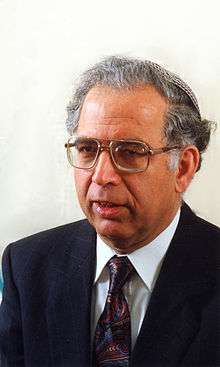Moshe Bar-Asher
Moshe Bar-Asher (Hebrew: משה בר-אשר; born 1939, Ksar es Souk, Morocco) is an Israeli linguist and the president of the Academy of the Hebrew Language in Jerusalem.
Professor Moshe Bar-Asher משה בר-אשר | |
|---|---|
 Moshe Bar-Asher | |
| Born | June 29, 1939 |
| Occupation | Linguist |
| Known for | President of the Academy of the Hebrew Language |
Background
Bar-Asher was born Moshe Ben Harush in Ksar es Souk (modern Errachidia), Morocco, in 1939. He immigrated to Israel in 1951 when he was twelve years old.[1][2] And he is the brother of Meir Bar-Asher
Bar-Asher received his Ph.D from the Hebrew University in 1976.[3] Between 1981 and 1983 he was chair of the university's Department of the Hebrew Language, and from 1983 to 1986 chair of the university's Institute for Jewish Studies. In 1987 he became vice president of the Academy of the Hebrew Language, of which he was appointed president in 1993.
Scholarship
Bar-Asher's scholarship has mainly been focused on three areas: Rabbinic Hebrew, Palestinian Syriac and Jewish languages.[4]
Awards and honors
- Eliezer Samson Rosenthal Prize for Talmudic studies (1988)
- Israel Prize in the field of Hebrew language and Jewish languages (1993)
- Honorary doctorate from the Institut National des Langues et Civilisations Orientales (1995)
- Yitzhak Ben-Zvi Prize for research into the customs of Oriental Jewry (2002)
- Honorary doctorate from Haifa University (2005)
- Rothschild Prize (2008)[2][3]
- EMET Prize (2012)[5]
Selected works
- Bar-Asher, Moshe (1991). "Some observations on the revival of Hebrew". European Regional Development Conference for Jewish Civilization Studies.
- Bar-Asher, Moshe (1991). "Some usages of the Hebrew component in modern Judeo-Arabic". Massorot.
- Bar-Asher, Moshe (1990). "On corrections and marginal versions in Codex Parma B (De Rossi 497) of the Mishna". In Moshe Bar-Asher; et al. (eds.). Segulla to Ariella: Essays and Belles-letters in Memory of Ariella Deem Goldberg.
- Bar-Asher, Moshe (1989). "Some aspects of the study of the Hebrew component in Eastern and Western neo-Judeo-Arabic". Massorot.
- Bar-Asher, Moshe (1988). "The Sharh of the Maghreb: Judeo-Arabic exegesis of the Bible and other Jewish literature – Its nature and formulation". Studies in Jewish Languages – Bible Translations and Spoken Dialects.
- Bar-Asher, Moshe (1988). "Studies in Mishnaic Hebrew". Proceedings of the Academy of the Hebrew Language: 28–30.
- Bar-Asher, Moshe (1987). "The different traditions of Mishnaic Hebrew". In David M. Golomb (ed.). Working With No Data. pp. 1–38.
- Bar-Asher, Moshe (1986). "Linguistic studies in the manuscripts of the Mishna". Proceedings of the Israeli Academy of Sciences and Humanities: 183–210.
See also
- List of Israel Prize recipients
- List of Israeli Mizrahi Jews and Sephardi Jews
- Arthur Pereyre
- Janice Rebibo
References
- "Jews of the Maghreb". Yale University. 2010. Retrieved 3 September 2011.
- "משה בר-אשר" [Moshe Bar-Asher] (in Hebrew). Academy of the Hebrew Language. Retrieved 3 September 2011.
- "Faculty Research Interests". The Hebrew University of Jerusalem. Retrieved 3 September 2011.
- "Moshe Bar-Asher | Yad Hanadiv". Yad Hanadiv. 2008. Retrieved 5 September 2011.
His work has been exceptional in three fields in particular.
- "Prof. Moshe Bar-Asher". en.emetprize.org. Retrieved 2017-11-30.